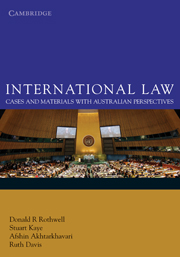Book contents
- Frontmatter
- Contents
- Preface
- About the authors
- Acknowledgements
- Table of cases
- Table of statutes
- Table of treaties and other international instruments
- Abbreviations
- 1 The nature of international law
- 2 Sources of international law
- 3 Law of treaties
- 4 International and municipal law
- 5 International legal personality
- 6 Sovereignty over territory
- 7 Jurisdiction
- 8 State responsibility
- 9 Human rights
- 10 Law of the sea
- 11 International environmental law
- 12 Enforcement of international law
- 13 The peaceful settlement of international disputes
- Index
- References
5 - International legal personality
- Frontmatter
- Contents
- Preface
- About the authors
- Acknowledgements
- Table of cases
- Table of statutes
- Table of treaties and other international instruments
- Abbreviations
- 1 The nature of international law
- 2 Sources of international law
- 3 Law of treaties
- 4 International and municipal law
- 5 International legal personality
- 6 Sovereignty over territory
- 7 Jurisdiction
- 8 State responsibility
- 9 Human rights
- 10 Law of the sea
- 11 International environmental law
- 12 Enforcement of international law
- 13 The peaceful settlement of international disputes
- Index
- References
Summary
Introduction
A central feature of the international legal system is that States are the predominant actors within the system, and possess international legal personality. This raises issues as to who possesses international legal personality and what it is. As O'Connell notes, ‘Legal action is the index of juristic personality; only persons comprehended by the law can perform actions prescribed by the law’. States possess international legal personality and are recognised legal actors in the international legal system. As a result, States are able to enter into legal relations with each other by way of treaties, possess certain international legal rights as bestowed under international law, and are capable of enforcing those legal rights in international litigation or of being the subject of a claim if they are derelict in meeting their international legal obligations. This in turn raises issues as to the characterisation of what are ‘States’ and how they are recognised under international law. Yet States are not the only entities with international legal personality and account needs to be taken of other international legal actors such as international organisations.
States, and the notion of ‘statehood’, have undergone significant evolution in recent centuries, and contemporary international law has had to keep abreast of these developments. While international law recognises that there are essential attributes to what comprises a ‘State’ for the purposes of the international legal system, there remain important political processes at play with respect to the recognition of States.
- Type
- Chapter
- Information
- International LawCases and Materials with Australian Perspectives, pp. 216 - 264Publisher: Cambridge University PressPrint publication year: 2010



